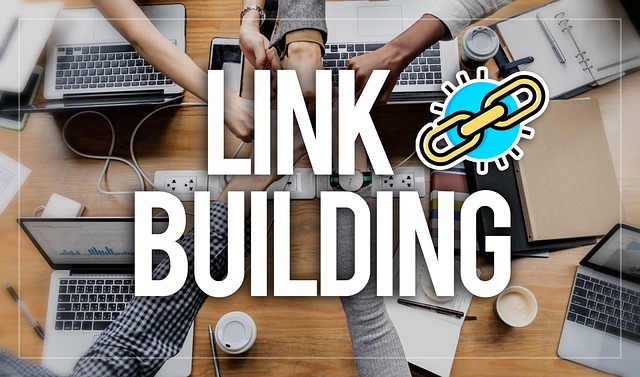Link building is a core content marketing strategy enhancing online authority through high-quality backlinks from reputable, relevant websites. It drives traffic, signals search engines of content value, and improves SEO by boosting domain authority and page rank. Effective tactics include guest blogging, offering unique resources, and leveraging social media to increase brand visibility and industry connections. Measuring KPIs like backlinks, domain authority, and click-through rates is crucial for strategy optimization. Avoiding manipulative practices, focusing on quality over quantity, and fostering genuine relationships are key to successful and sustainable link building in an evolving digital landscape.
In the dynamic landscape of digital marketing, content is king, but it’s the strategic link building that crowns the queen. Effective content marketing hinges on understanding the intricate dance of link building, a process that underpins search engine optimization (SEO) and amplifies brand visibility. This article delves into the very foundation of successful content marketing, exploring pivotal aspects like quality backlinks, diverse strategies, compelling content creation, guest blogging, social media leverage, and KPI tracking, while steering clear of common pitfalls to navigate the evolving algorithm landscape, ensuring your link-building efforts remain robust in the digital age.
Understanding Link Building: The Foundation of Effective Content Marketing

Link building is a fundamental strategy in content marketing, serving as the cornerstone for establishing authority and credibility online. It involves acquiring backlinks from reputable and relevant websites, which not only drives traffic to your site but also signals search engines that your content is valuable and trustworthy. Effective link building requires a strategic approach, focusing on creating high-quality content that naturally attracts links. This can be achieved through guest blogging, where you contribute informative articles to popular blogs in your niche, or by offering unique resources like comprehensive guides or research studies that other websites are eager to link to.
Building a robust link profile enhances your website’s search engine optimization (SEO) by improving its domain authority and page rank. When high-authority sites link to yours, it reinforces your brand’s reputation and increases the visibility of your content, making it more likely to appear in relevant searches. Moreover, link building fosters valuable connections within your industry, as you engage with influencers and peers who can contribute to a vibrant online ecosystem around your brand.
Why Quality Backlinks Matter for SEO and Brand Visibility

High-quality backlinks are a cornerstone in search engine optimization (SEO), playing a pivotal role in boosting both your site’s visibility and its authority. When reputable and relevant websites link to yours, it acts as a vote of confidence in the eyes of search engines like Google. This signal strengthens your website’s credibility, indicating that it offers valuable content worth sharing. As a result, search engines are more likely to rank your pages higher in organic search results, driving increased traffic and brand visibility.
Link building goes beyond just acquiring backlinks; it’s about fostering strategic partnerships and creating compelling content that naturally attracts links. When done right, quality backlinks become a powerful asset, helping you establish your brand as an authority in your industry. This not only improves your online presence but also paves the way for organic growth and long-term success.
Strategies to Build High-Value Links: A Content Marketer's Perspective

Building high-value links is a key component of successful content marketing strategies. Content marketers can employ several effective tactics to attract and earn backlinks from reputable sources. One powerful approach is creating in-depth, informative, and unique content that addresses specific user needs and questions. By offering valuable insights and solutions, content pieces naturally become resources others are willing to link back to. Encouraging shareability through social media integration and promoting content through relevant online communities can also expand its reach and visibility.
Additionally, building relationships with industry influencers and peers is strategic. Collaborating on guest blogging opportunities or requesting quotes for articles not only provides valuable backlinks but also strengthens connections within the industry. Content marketers should also consider diversifying their link profile by targeting a variety of backlink sources, including reputable websites, online publications, blogs, and directories relevant to their niche. This approach enhances domain authority and improves search engine rankings over time.
Creating Compelling Content That Naturally Attracts Links

Creating compelling content is a strategic must for effective link building. When your content offers genuine value, insights, or entertainment to readers, it naturally attracts links from other websites and influencers in your niche. This organic approach not only enhances your site’s authority but also ensures that the links are of high quality, a significant factor in search engine optimization (SEO).
Focus on producing unique, informative, and engaging content that addresses your audience’s pain points or interests. Whether it’s blog posts, infographics, videos, or podcasts, each format offers an opportunity to establish your brand as a thought leader while encouraging others to naturally link back to your content. Regularly updating your site with fresh content keeps visitors engaged and increases the likelihood of shares and backlinks, thereby boosting your overall Link Building strategy.
Guest Blogging and Its Impact on Link Profile Diversification

Guest blogging is a powerful strategy within link building, offering significant benefits for content marketers and website owners alike. By contributing high-quality articles to reputable blogs in their industry, businesses can access a new audience and gain valuable backlinks. These backlinks are crucial assets for enhancing a site’s search engine optimization (SEO) performance, as they indicate relevance and authority to search engines.
The impact of guest blogging extends beyond the immediate acquisition of links. It allows creators to establish themselves as thought leaders, showcasing expertise and fostering trust. When done right, this strategy can lead to long-term partnerships and collaborations, further diversifying a site’s link profile. A diverse link profile is essential for maintaining a strong SEO presence, as it signals to search algorithms that the website has value and authority from various sources.
Utilizing Social Media Platforms for Link Acquisition and Engagement

In today’s digital era, social media platforms have become powerful tools for content marketing and link building strategies. By leveraging popular channels like Twitter, LinkedIn, Instagram, and Facebook, businesses can increase their online visibility and establish authority in their respective industries. These platforms provide an excellent opportunity to share valuable content, engage with audiences, and drive traffic back to a website or blog, which are key aspects of successful link acquisition.
When utilizing social media for link building, creating compelling and interactive content is essential. This can include sharing informative articles, engaging videos, infographics, or interactive polls that encourage user participation. By consistently posting high-quality material, brands can attract organic traffic and potential links from other websites. Additionally, actively participating in conversations, responding to comments, and collaborating with influencers or industry peers can foster meaningful connections, leading to natural link opportunities.
Measuring Link Building Success: Key Performance Indicators (KPIs) to Track

Measuring the success of your link-building efforts is crucial for understanding what’s working and where improvements can be made. Key Performance Indicators (KPIs) are essential tools to track this progress. One of the primary KPIs to monitor is the number of high-quality backlinks acquired over a set period. These should come from reputable and relevant sources, such as industry-leading websites or influential blogs in your niche. The quality of links matters more than quantity; a single link from a respected authority can carry significant weight in search engine rankings compared to multiple links from lesser-known sites.
Another critical KPI is the domain authority (DA) of the backlinks. Domain authority, as determined by Search Engine Landfill (SEL), reflects the overall strength and power of a domain’s backlink profile. A higher DA indicates that the linked site is considered more trustworthy by search engines. When measuring link-building success, also keep an eye on click-through rates (CTRs) from these backlinks. A high CTR suggests that the links are not only present but also performing well in driving relevant traffic to your website.
Common Link Building Mistakes to Avoid in Your Strategy

Link building is a crucial component of any successful content marketing strategy, but it’s not without its pitfalls. Many businesses fall into common traps that hinder their SEO efforts and overall online visibility. One of the most significant mistakes to avoid is focusing solely on quantity over quality. While acquiring numerous links may seem appealing, these connections should be relevant and from authoritative sources. Using low-quality or irrelevant backlinks can negatively impact your search engine rankings due to what’s known as ‘link toxicity’.
Another mistake to steer clear of is neglecting the importance of natural link building. Search engines are smart; they can detect unnatural link patterns. Manipulating link profiles, such as buying links or engaging in spammy practices, can result in penalties. Instead, focus on creating valuable content that naturally attracts backlinks. Encourage sharing through social media, influencer collaborations, and guest blogging to build high-quality inbound links that enhance your site’s credibility and search engine positioning.
The Future of Link Building: Adapting to Changing Search Engine Algorithms

In an era defined by rapidly evolving search engine algorithms, the future of link building is about adaptability and authenticity. As search engines like Google become increasingly sophisticated, they are becoming better at identifying low-quality or manipulative links, which can lead to penalties for websites engaging in such practices. Instead, the focus should be on acquiring high-quality backlinks that reflect natural growth and relevant authority. This shift requires content marketers to strategize creatively, focusing on producing exceptional, shareable content that resonates with their target audience.
Link building should evolve from a transactional approach to a relationship-building one. This involves engaging in collaborative efforts, such as guest blogging on reputable sites or creating industry resources that naturally attract backlinks. By prioritizing quality and relevance over quantity, content marketers can ensure their link-building strategies remain effective and sustainable in the face of changing search engine landscape.
